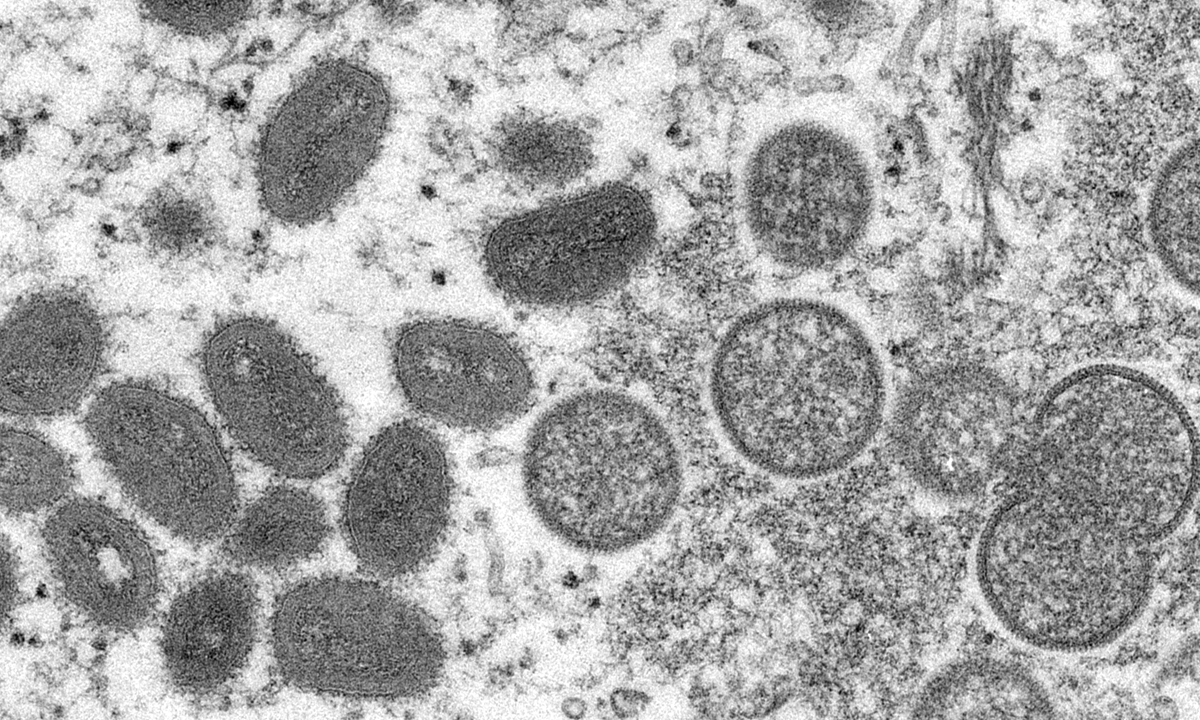
Monkeypox virus particles under a microscope Photo: VCG
Domestic mpox vaccines have not hit the market but research institutions in China have been carrying out clinical trials, Chinese experts said on Monday as the World Health Organization (WHO) declared the mpox surge a public health emergency of international concern - its highest alert level and urged manufacturers to ramp up vaccine production to rein in the spread of a more dangerous strain of the virus.
The WHO urged pharmaceutical firms to ramp up vaccine production on August 16 local time after it warned of the rapid spread of the new Clade 1b variant, a more deadly mpox strain, from the Democratic Republic of Congo (DRC) to other African countries.
Meanwhile, the Stockholm-based European Centre for Disease Prevention and Control (ECDC) on Friday raised its risk level for mpox to "moderate" from "low," a day after global health officials confirmed the first infection caused by a new strain of the virus outside Africa, in Sweden, which was followed by more sporadic cases appearing in the EU, with the overall risk to the population having gone up from "very low" to "low," Reuters reported on Friday.
WHO spokeswoman Margaret Harris urged manufacturers to scale up mpox vaccine production, according to a report from Agence France-Presse (AFP) on August 17. The WHO also asked countries with mpox vaccine stockpiles to donate them to countries with ongoing outbreaks, according to the AFP.
According to Lu Hongzhou, head of the Third People's Hospital of Shenzhen, there is currently no domestic mpox vaccine available in the Chinese mainland, whereas research and preparations are underway, and relevant clinical trials have been promptly carried out.
In July of 2023, the replication-deficient mpox vaccine developed by the China National Pharmaceutical Group Corporation (Sinopharm) and Chinese Center for Disease Control and Prevention passed the clinical trial application phase with the National Medical Products Administration, making it the earliest domestically developed mpox vaccine to enter the clinical research stage in China.
However, due to the small number of mpox cases across the country and a dispersed population, it is difficult to conduct large-scale clinical studies on the vaccine's efficacy. Additionally, the risks and challenges of such studies are significant, making the development of an mpox vaccine face numerous challenges, Su Jinfeng, a senior biomedical engineer, said in an interview with the Global Times previously.
During the last mpox epidemic on the Chinese mainland, the first imported mpox case was discovered in September 2022 and the first local infection was reported in June 2023. In the following three months between June and August, over 1,000 local confirmed cases were reported across more than 20 provinces across the country, which was triggered by local secondary outbreaks and covert transmission, according to The Beijing News.
On September 20, 2023, mpox was classified as a Category B infectious disease under China's infectious disease control law while China's National Health Commission stated that the mpox epidemic would continue to exist within the country for a certain period of time.
Since the beginning of this year, a total of 357 cases of mpox were reported nationwide as of this June, with no related deaths reported, according to the National Disease Control and Prevention Administration.
Lu said that based on the current prevention and control measures and the domestic epidemic monitoring situation, there is a relatively low possibility of a surge in mpox infections in the Chinese mainland.
China's General Administration of Customs announced on Friday that it would begin screening people and goods entering the country for mpox over the next six months. People arriving from countries where outbreaks have occurred, who have been in contact with mpox cases, or display symptoms should declare this information to customs authorities when entering the country, adding that vehicles, containers, and items from areas with mpox cases should be sanitized.
According to Lu, the mpox virus strain currently circulating on the Chinese mainland belongs to the lineage C.1.1 under the Clade IIb strain, which caused the global outbreak of mpox between 2022 and 2023. Considering peak travel season and the frequent international exchanges, the risk of cross-border transmission of the mpox virus may increase.
However, the mpox virus is primarily transmitted through prolonged close contact, such as sexual activities, skin-to-skin contact, and close-distance breathing or conversations between people, Lu told the Global Times on Monday, noting that its ability to spread between people is relatively weak.
Meanwhile, many people aged 40 and above in the Chinese mainland have already been inoculated with smallpox vaccines, the administration of which, Lu said, has an efficacy of 85 percent in preventing mpox.
Given China's current strict border control and epidemic prevention measures, it is difficult for new cases to spread to the country from overseas. Therefore, the likelihood of a rapid increase in infections in the Chinese mainland like that back in 2023 is relatively low based on the current prevention and control measures and domestic epidemic monitoring, Lu said.
Aside from vaccination, treatments of mpox mainly consist of supportive care and the treatment of complications. Currently, antiviral drugs used in the treatment of mpox include cidofovir, brincidofovir, and tecovirimat. Additionally, ongoing clinical trials of a series of small molecule drugs for mpox have also found that some medicines at lower doses can specifically inhibit the replication of the mpox virus.




